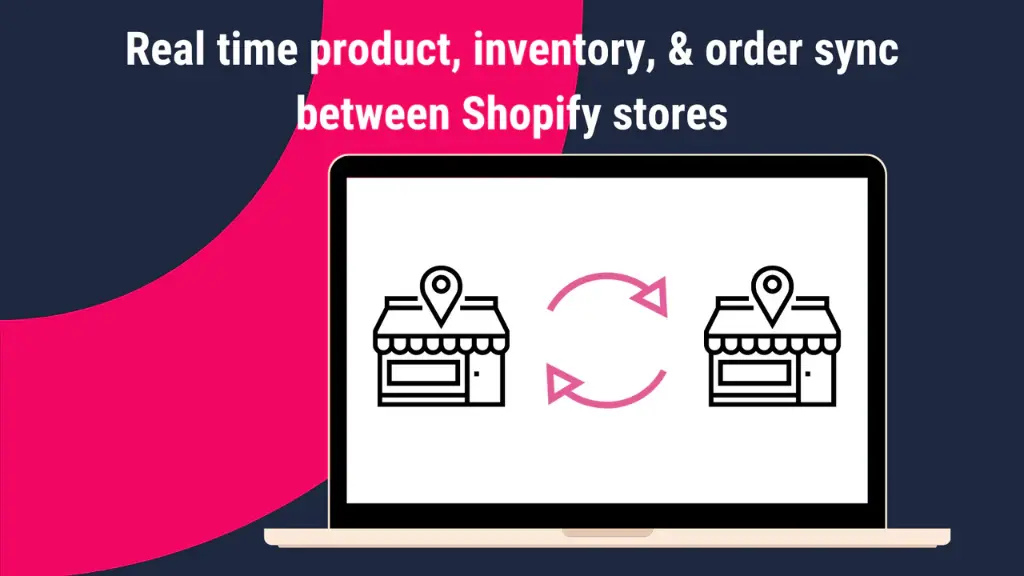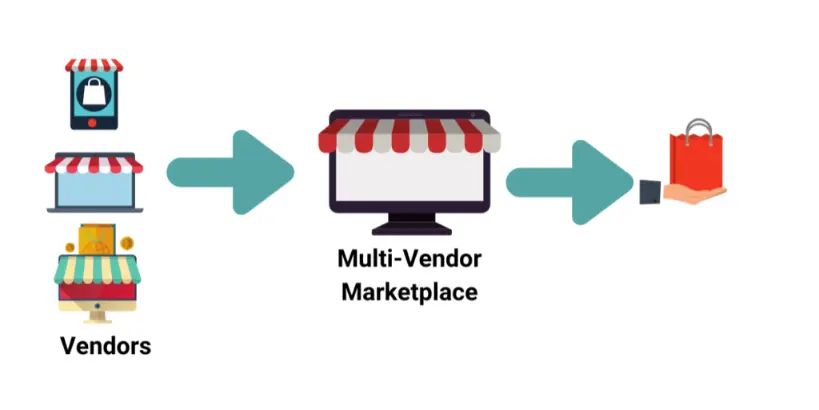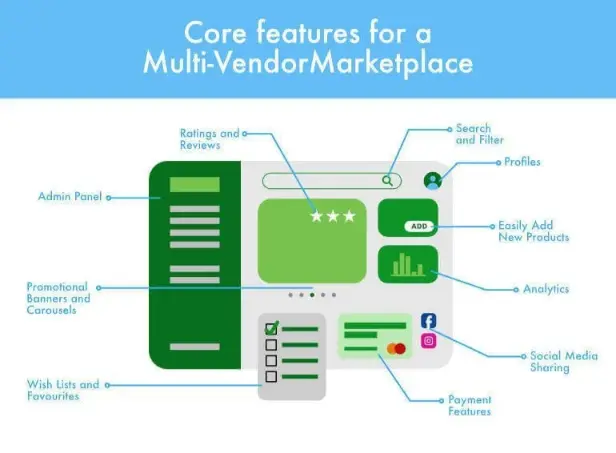Multi-vendor marketplaces are emerging in the world of e-commerce as they offer a single platform for multiple sellers to list and sell their products or services. It provides a diverse range of products and a wider customer base. If you are thinking of building one multi-vendor marketplace, then you are at the right place, where we will compare seven top-rated free shopify multi-vendor marketplaces, featuring shopify multi sellers with their shopify multi vendor marketplaces reviews.
Why Multi Vendor Marketplace should be created at Shopify

Lower Start-Up Costs: Building a multi-vendor marketplace on Shopify offers specifically lower start-up costs compared to a traditional e-commerce store. You do not need to invest in inventory, neither focus on developing or marketing your e-store presence. Shopify takes care of all this tasks and saves you additional costs of maintenance of your website with help of shopify multi sellers.
Faster Income for the Owner: Leveraging shopify Multi vendor marketplace to showcase your e-commerce store, boosts your visibility and makes sales faster than a traditional e-commerce store, as its has mainly two types of models for multi vendor marketplace, one where vendors opt for yearly subscription to avail services and another model is commission based where vendor pays commission on each sale they make.
Simpler Marketing: Marketing at shopify’s multi vendor marketplace is extremely easy as it mainly focus on attractive programs for vendors and user friendly customer experience. Making it way more easy and smooth process to market , than a traditional e-commerce store which requires specialized marketing strategies for their visibility and boosting sales, shopify multi vendor marketplace reviews.
1. Shopify Multi Vendor Marketplace by Webkul

Overview: Multi Vendor Marketplace is a single platform for building a marketplace on your Shopify store. Shopify multi seller allows multiple sellers to register, list products, and manage orders.
Features:
- Seller registration and profile management
- Product listing and management
- Order management & Tracking
- Commission management
- Review and rating system
Pricing structure:
Webkul offers a range of plans for different needs: Basic at $15/month, Executive at $40/month, Pro at $60/month, and a customizable Enterprise plan for larger requirements
Pros:
- Easy to build and operate
- Specialized commission structure
- Balanced review system
Cons:
- Limited customization options for the storefront
- Basic customer support for the free version
Suitable For: Small to medium-scale businesses looking to expand their product range with minimal investment.
2. Order Fulfillment Guru

Overview: Order Fulfillment Guru focuses on streamlining the order fulfillment process for shopify multi-vendor marketplaces. It ensures that orders are efficiently managed and fulfilled by the respective vendors.
Features:
- Automated order routing to vendors
- Inventory management
- Real-time order tracking
- Vendor-specific shipping options
Pricing structure:
Order Fulfillment Guru provides three plans: a free Basic plan, Standard at $29/month, and Pro at $49/month, catering to varying order volumes and support needs.
Pros:
- Efficient order management system
- Real-time tracking and notifications
- Reduces fulfillment errors
Cons:
- May require integration with other apps for complete marketplace functionality
- Limited customization for vendor profiles
Suitable For: Businesses prioritizing order fulfillment efficiency and accuracy with shopify multi vendor makretplace reviews.
3. Puppet Vendors

Overview: Puppet Vendors offers a flexible and user-friendly platform for creating a multi-vendor marketplace on Shopify. It supports various vendor management features and integrates seamlessly with Shopify.
Features:
- Vendor registration and management
- Product listing and categorization
- Order and commission management
- Vendor dashboard
Pricing structure:
Puppet Vendors offers pricing tiers to suit different business sizes: Basic at $10/month, Pro at $30/month, and customizable Enterprise plans for comprehensive features and support.
Pros:
- User-friendly interface
- Comprehensive vendor management
- Customizable vendor profiles
Cons:
- Limited advanced features in the free version
- Customer support could be improved
Suitable For: Businesses seeking a straightforward and efficient multi-vendor marketplace solution.
4. Shipturtle

Overview: Shipturtle is designed to simplify the multi-vendor marketplace setup and management process. It offers robust features to manage vendors, products, and orders effectively. Shipturtle has best shopify multi vendor marketplace reviews.
Features:
- Vendor onboarding and management
- Product synchronization
- Automated order splitting
- Inventory management
Pricing structure:
Shipturtle’s plans are designed for scalability: Starter at $25/month, Growth at $75/month, and custom Enterprise pricing, offering robust features and dedicated support
Pros:
- Easy integration with Shopify
- Automated order management
- Supports bulk product import/export
Cons:
- Limited customization for vendor storefronts
- Basic support for the free version
Suitable For: Businesses looking for an automated and efficient marketplace solution with minimal manual intervention.
5. Vendor Payout Multi Vendor

Overview: Vendor Payout Multi Vendor focuses on simplifying the financial aspects of running a multi-vendor marketplace. It automates vendor payouts and commission calculations.
Features:
- Automated vendor payouts
- Commission calculation and management
- Vendor sales reports
- Integration with various payment gateways
Pricing structure:
Vendor Payout Multi Vendor has plans to meet diverse needs: Basic at $19/month, Standard at $49/month, and Pro at $99/month, with varying order management and payout features.
Pros:
- Simplifies financial management
- Accurate commission calculations
- Detailed sales reports
Cons:
- Limited features for vendor and product management
- May require additional apps for complete functionality
Suitable For: Businesses prioritizing financial transparency and accurate vendor payouts.
6. Onport

Overview: Onport offers a powerful platform for creating and managing a multi-vendor marketplace on Shopify. It provides extensive features for vendor, product, and order management.
Features:
- Vendor registration and management
- Product catalog management
- Order and shipping management
- Commission and payout automation
Pricing structure:
Onport offers three pricing options: Starter at $99/month, Growth at $199/month, and customizable Enterprise plans, providing extensive features and premium support.
Pros:
- Comprehensive feature set
- Seamless integration with Shopify
- Customizable vendor storefronts
Cons:
- Steeper learning curve for beginners
- Limited customer support for free users
Suitable For: Medium to large businesses looking for a feature-rich marketplace solution.
7. Vendor Consignment

Overview: Vendor Consignment is designed for businesses that operate on a consignment model. It allows vendors to list products on consignment and manage their inventory and orders.
Features:
- Vendor consignment management
- Inventory tracking
- Order management
- Commission and payout calculation
Pricing structure:
Vendor Consignment’s plans include Basic at $20/month, Pro at $50/month, and customizable Enterprise plans, tailored to manage consignment operations efficiently.
Pros:
- Ideal for consignment-based businesses
- Efficient inventory and order management
- Accurate commission calculations
Cons:
- Limited features for non-consignment businesses
- Basic support for the free version
Suitable For: Businesses operating on a consignment model looking for an efficient marketplace solution.
Comparison of Multi Vendor Marketplace for Shopify
| Feature/ App | Multi Vendor Marketplace | Order Fulfillment Guru | Puppet Vendors | Shipturtle | Vendor Payout Multi Vendor | Onport | Vendor Consignment |
|---|---|---|---|---|---|---|---|
| Vendor Management | Yes | Basic | Yes | Yes | Basic | Yes | Yes |
| Product Listing | Yes | No | Yes | Yes | No | Yes | Yes |
| Order Management | Yes | Yes | Yes | Yes | No | Yes | Yes |
| Commission Management | Yes | No | Yes | Yes | Yes | Yes | Yes |
| Vendor Payouts | Yes | No | Yes | Yes | Yes | Yes | Yes |
| Review System | Yes | No | No | No | No | Yes | No |
| Inventory Management | Yes | Yes | Yes | Yes | No | Yes | Yes |
| Automated Order Routing | No | Yes | No | Yes | No | Yes | No |
| Vendor Dashboard | Yes | No | Yes | Yes | Yes | Yes | Yes |
| Customization Options | Limited | Limited | Moderate | Limited | Limited | Extensive | Moderate |
| Integration with Shopify | Yes | Yes | Yes | Yes | Yes | Yes | Yes |
| Customer Support (Free) | Basic | Basic | Basic | Basic | Basic | Basic | Basic |
| Pricing (Free Plan) | Free plan available | Free plan available | Free plan available | Free plan available | Free plan available | Free plan available | Free plan available |
| Premium Pricing | Varies (from $11/month) | Varies (from $9/month) | Varies (from $10/month) | Varies (from $15/month) | Varies (from $12/month) | Varies (from $29/month) | Varies (from $10/month) |
| Ideal For | Small to Medium Business | Fulfillment-focused | User-friendly | Automation-focused | Financial Management | Feature-rich Needs | Consignment Model |
Concluding all Shopify Multi Vendor Marketplaces
Choosing the right multi-vendor marketplace app for your Shopify store depends on your specific needs such as order fulfillment, financial management, or consignment operations, and select the app that best fits your requirements. While there are several great multi-vendor marketplace apps available for Shopify, ShipTurtle is considered one of the best multi-vendor marketplaces for its extensive feature set, customization options, and excellent customer support. It’s a powerful tool that helps you with your operations, enhances your vendor relationships, and boosts your sales.
FAQ‘s:
Is multi vendor marketplace profitable?
Yes, multi-vendor marketplaces can be profitable due to multiple revenue streams, zero inventory costs, and competitive pricing.
How does multi vendor marketplace work?
Multiple vendors list their products on single platform & buyers get to chose & purchase from multiple range of products, and the marketplace admin who manages the platform, also earns commission on each sale.
What is the difference between vendor and seller on marketplace?
There is no significant difference, both terms refer to entities that list products for sale on the marketplace.
Is Shopify good for multi vendor?
Yes, Shopify offers several benefits for creating a multi-vendor marketplace, including robust scalability, extensive app integrations for customizations, and a user-friendly interface that simplifies vendor management. It provides secure payment gateways and comprehensive analytics to track sales and performance.
How do I choose the best marketplace?
Consider factors such as marketplace fees, seller support, audience demographics, seller reputation, and any unique features or tools offered by each platform. Reading reviews and reaching out to other sellers who have experience with different marketplaces can provide valuable insights.
How do I run a marketplace on Shopify?
Use Shopify’s multi-vendor apps, configure settings, onboard vendors, and manage sales and commissions through the platform.


